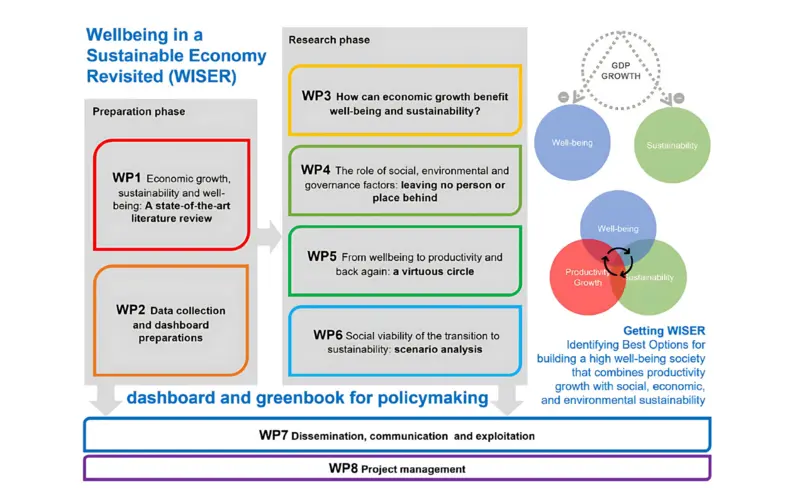Activities
Work packages

The project is divided into 8 work packages that can be divided in three phases.
Phase A: Preparation phase. WP1 provides our conceptual framework for the research work packages in Phase B. WP2 consists of data compilation and preparations for construction of a dashboard for well-being in a sustainable economy, including a stocktaking of what indicators need to be included in a dashboard, and how a dashboard should be used by stakeholders (i.e., decision rules)
Phase B: Research phase. In the research phase we address four challenging and new questions on the interface of economic growth, well-being and sustainability that are important for policymaking to move from a society in which economic growth harms well-being and sustainability to a society in which economic growth promotes well-being and is sustainable. These packages will guide the dashboard and policy Greenbook in Phase C.
In WP3, we study which processes of economic growth (productivity growth and production growth) can possibly contribute to well-being in a sustainable manner.
WP4 focuses on the question how non-economic factors can be important for both sustainable well-being and economic growth. Here, the focus lies on the built, natural and social environment of people and attention is paid to inequality and vulnerable populations. WP5 builds on ideas of WP3 and WP4and explores why some countries are better able to transform their economic and non-economic resources into well-being. WP6 extends WP4 and WP5 by evaluating the impact of social capital and relational goods on well-being and the economy. It also provides a toolkit for a strategic foresight towards social cohesion, well-being and prosperity. In sum, WP6 seeks to address the question: is the envisaged social change viable? What are the possible scenarios?
Phase C: Valorisation. WP7 is dedicated to the valorisation of our findings. A communication strategy will be developed, by managing an international group of experts and stakeholders while building several levels of reach: academic researchers, policymakers, and the general public. Special emphasis will be put on dissemination to policymakers by creating a dashboard and Greenbook for policymaking in a WISER economy as well as a workshop and training program to facilitate implementation.
